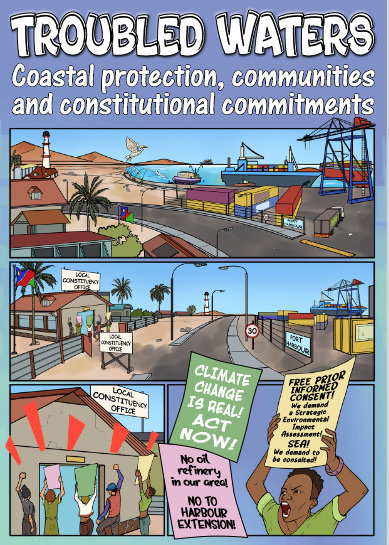Last week, Hans-Christian Mahnke won the Environmental Investment Fund of Namibia (EIF) Sustainable Development Award (2024) in the arts category for writing the comic ‘Troubled Waters’.
‘Troubled Waters’ examines the various conflicting considerations that come up in a small Namibian coastal town when a port extension is planned.
It tackles contemporary issues that many Namibians face, such as the very real need for jobs and development, which must be balanced by the sustainable use of the country’s resources.
The Hanns Seidel Foundation provided the funding for ‘Troubled Waters’, enabling the Legal Assistance Centre to print around 10 000 copies which were distributed across the country, mainly at the coast and predominantly to schools to get the material into the hands of teachers.
The comic tackles complex climate change issues, such as planning developments in protected areas and what it means for sensitive ecological areas, and breaks it down into bite-sized chunks of information that can be easily understood by a wide range of Namibians.
“My task was to write something on climate change and current issues that are relevant to Namibian society,” Mahnke said earlier this week.
“Green hydrogen, offshore oil production and now also salmon farming – all these developments are talked about by politicians and many in society as if they are approved projects. Yet many of these planned projects, which cause direct and indirect environmental harm, both in the short and long term, do not have the necessary permits in place,” he said.
The use of the comic format to illustrate and break complex issues down into digestible pieces is both useful and commendable, and it brings the focus back to Nambians and how any planned developments should benefit the people, as well as consider future generations.
Tafy Tang Studio provided the illustrations for ‘Troubled Waters’, which further places Namibians at the centre of a topical narrative through the creative use of imagery which provides a tangible sense of representation.
“It is important to communicate complex issues in an easily understandable way,” said Mahnke.
“Working in the field of environmental education, people often think comics are for children only, but comics are a high art form. And environmental education is not for children only.”
He emphasised that the comic is suitable for all audiences, from school pupils to those at State House.

“Comics are intended to speak to various audiences, be it traditional authorities or communities at large. If funding is available, one would seek to translate it into local languages, particularly languages of the area where the projects are planned,” Mahnke said.
He highlighted how some proposed development projects require additional infrastructure and need to be assessed in terms of their social and environmental impact before being approved.
“Think about the need for a new harbour in the area of Angra Pequena, the extension of the port harbour encircling Shark Island even further, a desalination plant, et cetera,” he noted.
“The comic intends to educate people about the rights of interested and affected parties in a process where environmental and social impacts have to be assessed. And by doing so, we can also discuss the pros and cons of a certain planned project.”
Mahnke said despite the law requiring interested and affected parties of planned developments to be consulted, and not merely informed, the consultation process is often not done properly. In addition, he said many times the community or interested and affected parties do not know their rights regarding these developments.
“Hence, we decided on a story which would provide information to the coastal communities, a story relating to the coastal area and its management,” he said.
“I left certain elements open, as the scenario plays out elsewhere in a similar fashion. The reader can learn from the comic, as the way the issue is covered enables one to transfer the scenario to other situations elsewhere.”
Mahnke is a political scientist who has been active in the field of environmental education over the last six years.
He specialises in media and outreach activities and community and stakeholder engagement in the field of environmental education and public participation.
Over recent years, Mahnke has served on the Ministry of Environment, Forestry and Tourism’s Environmental Education Action Task Force, and he is a member of the non-governmental organisation working group on wildlife crime.
“I am very excited about winning the award, as the feedback in the last month was very positive. With the award, I hope the comic can further spread and the information provided will help people exercise their rights,” he said.
The prize money of N$20 000 will go to the excellently managed Namib Desert Environmental Education Trust (NaDeet) at Swakopmund, he added.
“NaDeet recently moved premises, and as we all know, renovations cost money. With the award money contribution, I hope we can support them a bit. They give so much to our society, it is time to give back.”
Mahnke noted that he is currently developing a few more comic ideas in spite of the fact that comics are often not taken seriously.
“Six months after the comic was published, the Namibia Chamber of Environment highlighted the same issues as the comic, and the media and the political establishment took notice of these issues.
“It seems no one in the corridors of power takes note, but I hope the award will change that situation,” he said.
Stay informed with The Namibian – your source for credible journalism. Get in-depth reporting and opinions for
only N$85 a month. Invest in journalism, invest in democracy –
Subscribe Now!







